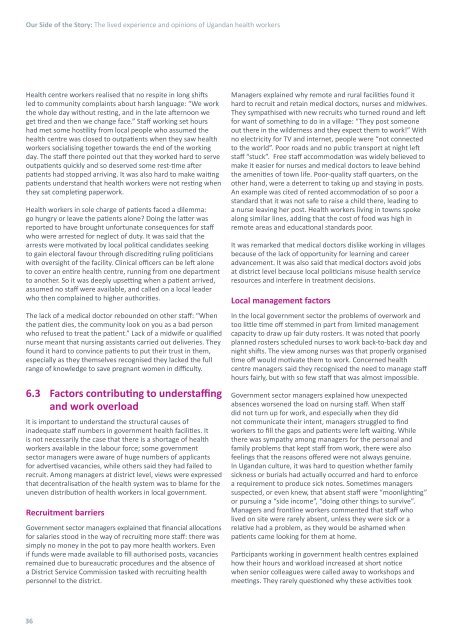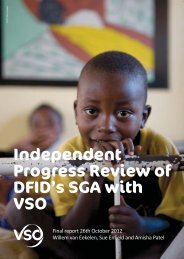Our Side of the Story - VSO
Our Side of the Story - VSO
Our Side of the Story - VSO
- No tags were found...
Create successful ePaper yourself
Turn your PDF publications into a flip-book with our unique Google optimized e-Paper software.
<strong>Our</strong> <strong>Side</strong> <strong>of</strong> <strong>the</strong> <strong>Story</strong>: The lived experience and opinions <strong>of</strong> Ugandan health workersHealth centre workers realised that no respite in long shiftsled to community complaints about harsh language: “We work<strong>the</strong> whole day without resting, and in <strong>the</strong> late afternoon weget tired and <strong>the</strong>n we change face.” Staff working set hourshad met some hostility from local people who assumed <strong>the</strong>health centre was closed to outpatients when <strong>the</strong>y saw healthworkers socialising toge<strong>the</strong>r towards <strong>the</strong> end <strong>of</strong> <strong>the</strong> workingday. The staff <strong>the</strong>re pointed out that <strong>the</strong>y worked hard to serveoutpatients quickly and so deserved some rest-time afterpatients had stopped arriving. It was also hard to make waitingpatients understand that health workers were not resting when<strong>the</strong>y sat completing paperwork.Health workers in sole charge <strong>of</strong> patients faced a dilemma:go hungry or leave <strong>the</strong> patients alone? Doing <strong>the</strong> latter wasreported to have brought unfortunate consequences for staffwho were arrested for neglect <strong>of</strong> duty. It was said that <strong>the</strong>arrests were motivated by local political candidates seekingto gain electoral favour through discrediting ruling politicianswith oversight <strong>of</strong> <strong>the</strong> facility. Clinical <strong>of</strong>ficers can be left aloneto cover an entire health centre, running from one departmentto ano<strong>the</strong>r. So it was deeply upsetting when a patient arrived,assumed no staff were available, and called on a local leaderwho <strong>the</strong>n complained to higher authorities.The lack <strong>of</strong> a medical doctor rebounded on o<strong>the</strong>r staff: “When<strong>the</strong> patient dies, <strong>the</strong> community look on you as a bad personwho refused to treat <strong>the</strong> patient.” Lack <strong>of</strong> a midwife or qualifiednurse meant that nursing assistants carried out deliveries. Theyfound it hard to convince patients to put <strong>the</strong>ir trust in <strong>the</strong>m,especially as <strong>the</strong>y <strong>the</strong>mselves recognised <strong>the</strong>y lacked <strong>the</strong> fullrange <strong>of</strong> knowledge to save pregnant women in difficulty.6.3 Factors contributing to understaffingand work overloadIt is important to understand <strong>the</strong> structural causes <strong>of</strong>inadequate staff numbers in government health facilities. Itis not necessarily <strong>the</strong> case that <strong>the</strong>re is a shortage <strong>of</strong> healthworkers available in <strong>the</strong> labour force; some governmentsector managers were aware <strong>of</strong> huge numbers <strong>of</strong> applicantsfor advertised vacancies, while o<strong>the</strong>rs said <strong>the</strong>y had failed torecruit. Among managers at district level, views were expressedthat decentralisation <strong>of</strong> <strong>the</strong> health system was to blame for <strong>the</strong>uneven distribution <strong>of</strong> health workers in local government.Recruitment barriersGovernment sector managers explained that financial allocationsfor salaries stood in <strong>the</strong> way <strong>of</strong> recruiting more staff: <strong>the</strong>re wassimply no money in <strong>the</strong> pot to pay more health workers. Evenif funds were made available to fill authorised posts, vacanciesremained due to bureaucratic procedures and <strong>the</strong> absence <strong>of</strong>a District Service Commission tasked with recruiting healthpersonnel to <strong>the</strong> district.Managers explained why remote and rural facilities found ithard to recruit and retain medical doctors, nurses and midwives.They sympathised with new recruits who turned round and leftfor want <strong>of</strong> something to do in a village: “They post someoneout <strong>the</strong>re in <strong>the</strong> wilderness and <strong>the</strong>y expect <strong>the</strong>m to work!” Withno electricity for TV and internet, people were “not connectedto <strong>the</strong> world”. Poor roads and no public transport at night leftstaff “stuck”. Free staff accommodation was widely believed tomake it easier for nurses and medical doctors to leave behind<strong>the</strong> amenities <strong>of</strong> town life. Poor-quality staff quarters, on <strong>the</strong>o<strong>the</strong>r hand, were a deterrent to taking up and staying in posts.An example was cited <strong>of</strong> rented accommodation <strong>of</strong> so poor astandard that it was not safe to raise a child <strong>the</strong>re, leading toa nurse leaving her post. Health workers living in towns spokealong similar lines, adding that <strong>the</strong> cost <strong>of</strong> food was high inremote areas and educational standards poor.It was remarked that medical doctors dislike working in villagesbecause <strong>of</strong> <strong>the</strong> lack <strong>of</strong> opportunity for learning and careeradvancement. It was also said that medical doctors avoid jobsat district level because local politicians misuse health serviceresources and interfere in treatment decisions.Local management factorsIn <strong>the</strong> local government sector <strong>the</strong> problems <strong>of</strong> overwork andtoo little time <strong>of</strong>f stemmed in part from limited managementcapacity to draw up fair duty rosters. It was noted that poorlyplanned rosters scheduled nurses to work back-to-back day andnight shifts. The view among nurses was that properly organisedtime <strong>of</strong>f would motivate <strong>the</strong>m to work. Concerned healthcentre managers said <strong>the</strong>y recognised <strong>the</strong> need to manage staffhours fairly, but with so few staff that was almost impossible.Government sector managers explained how unexpectedabsences worsened <strong>the</strong> load on nursing staff. When staffdid not turn up for work, and especially when <strong>the</strong>y didnot communicate <strong>the</strong>ir intent, managers struggled to findworkers to fill <strong>the</strong> gaps and patients were left waiting. While<strong>the</strong>re was sympathy among managers for <strong>the</strong> personal andfamily problems that kept staff from work, <strong>the</strong>re were als<strong>of</strong>eelings that <strong>the</strong> reasons <strong>of</strong>fered were not always genuine.In Ugandan culture, it was hard to question whe<strong>the</strong>r familysickness or burials had actually occurred and hard to enforcea requirement to produce sick notes. Sometimes managerssuspected, or even knew, that absent staff were “moonlighting”or pursuing a “side income”, “doing o<strong>the</strong>r things to survive”.Managers and frontline workers commented that staff wholived on site were rarely absent, unless <strong>the</strong>y were sick or arelative had a problem, as <strong>the</strong>y would be ashamed whenpatients came looking for <strong>the</strong>m at home.Participants working in government health centres explainedhow <strong>the</strong>ir hours and workload increased at short noticewhen senior colleagues were called away to workshops andmeetings. They rarely questioned why <strong>the</strong>se activities took36
















